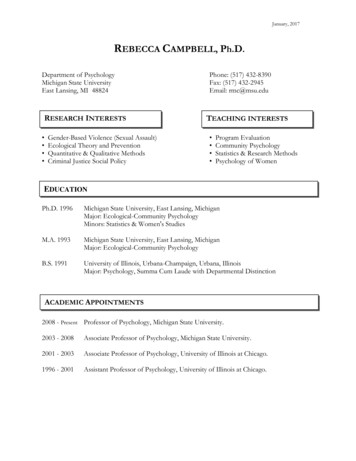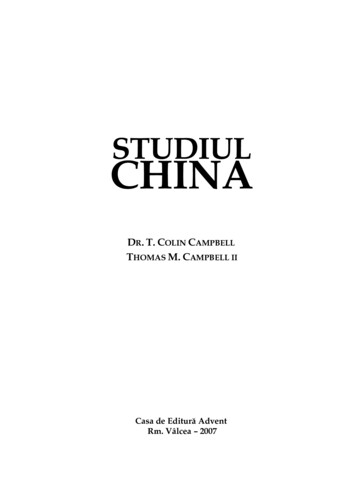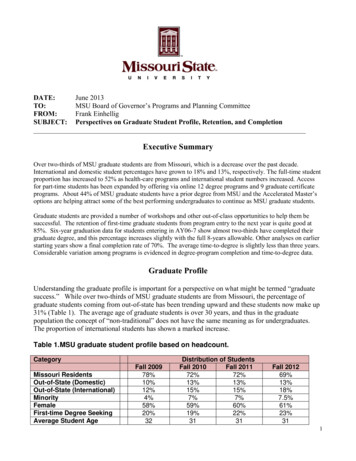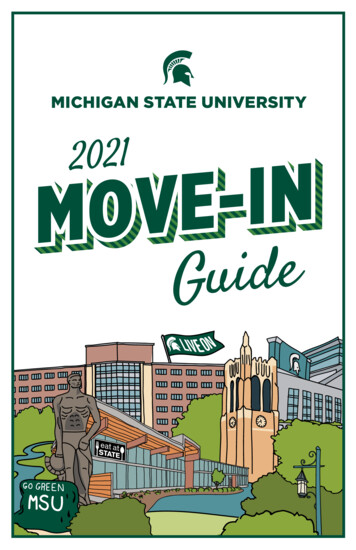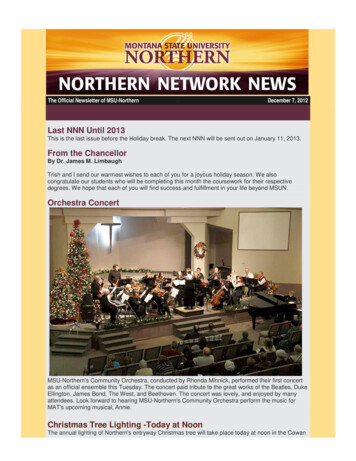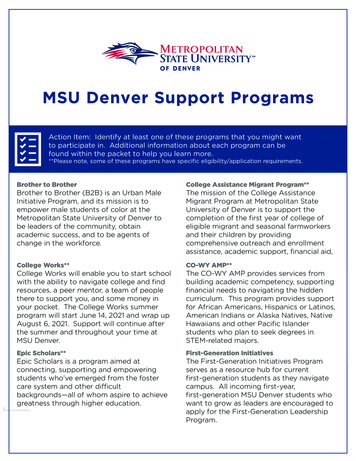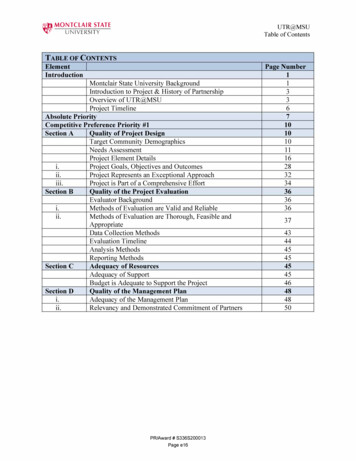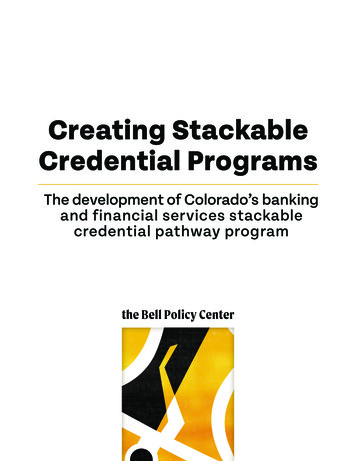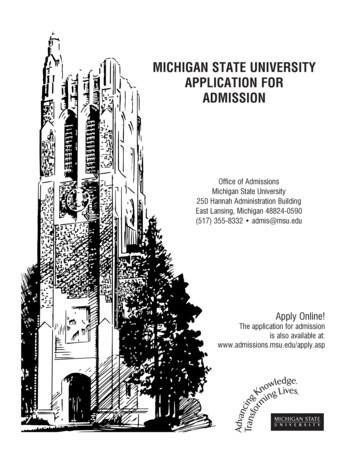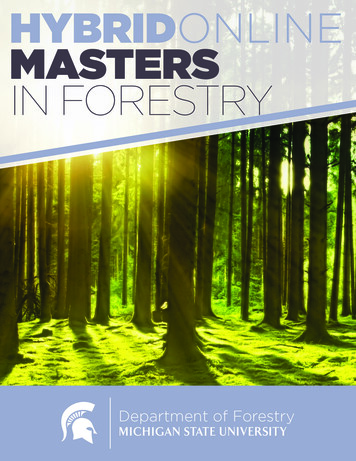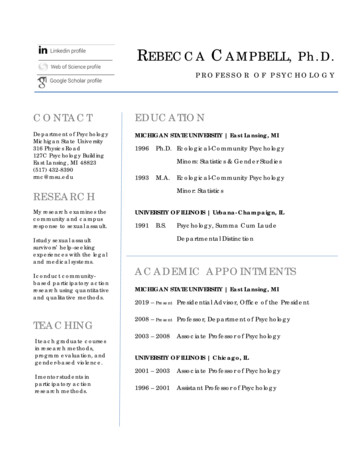
Transcription
R EBECCA C AMPBELL,Ph.D.PROFESSOR OF PSYCHOLOGYCONTACTEDUCATIONDepartment of PsychologyMichigan State University316 Physics Road127C Psychology BuildingEast Lansing, MI 48823(517) 432-8390rmc@msu.eduMICHIGAN STATE UNIVERSITY East Lansing, MI1996Ph.D. Ecological-Community PsychologyMinors: Statistics & Gender Studies1993M.A.Minor: StatisticsRESEARCHMy research examines thecommunity and campusresponse to sexual assault.I study sexual assaultsurvivors’ help-seekingexperiences with the legaland medical systems.I conduct communitybased participatory actionresearch using quantitativeand qualitative methods.TEACHINGI teach graduate coursesin research methods,program evaluation, andgender-based violence.I mentor students inparticipatory actionresearch methods.T EA CH I N GEcological-Community PsychologyUNIVERSITY OF ILLINOIS Urbana-Champaign, IL1991B.S.Psychology, Summa Cum LaudeDepartmental DistinctionACADEMIC APPOINTMENTSMICHIGAN STATE UNIVERSITY East Lansing, MI2019 – Present Presidential Advisor, Office of the President2008 – Present Professor, Department of Psychology2003 – 2008Associate Professor of PsychologyUNIVERSITY OF ILLINOIS Chicago, IL2001 – 2003Associate Professor of Psychology1996 – 2001Assistant Professor of Psychology
2CAREER AWARDS2020Inspirational Woman of the Year Award, Center for Gender in Global Context,Michigan State University.2019Champion of Justice Award, Michigan Domestic & Sexual Violence Prevention &Treatment Board, Michigan Department of Health & Human Services.2019Notable Women in Educational Leadership Award, Crain’s Detroit Business.2019Teal Ribbon Award, Outstanding Individual Leadership for Sexual Assault Survivors,Michigan State University Sexual Assault Program.2019Richard P. Kluft Best Article Award (Honorable Mention), Journal of Trauma &Dissociation.2017W.K. Kellogg Foundation Community Engagement Scholarship Award, ExemplaryProject for The Detroit Sexual Assault Kit (SAK) Action Research Project, Associationof Public & Land Grant Universities (APLU).2017Community Engagement Scholarship Award for The Detroit Sexual Assault Kit (SAK)Action Research Project, Office of University Outreach & Engagement, MichiganState University.2017Distinguished Partnership for Community-Engaged Research Award, with theWayne County Prosecutor’s Office, Office of University Outreach & Engagement,Michigan State University (Inaugural Recipient).2017Distinguished Fellow, International Association of Forensic Nurses, MichiganChapter.2016Visionary Award for Leadership in Ending Violence Against Women (Career Award),End Violence Against Women International.2015Vision 21 Crime Victims Research Award, Office for Victims of Crime, Office ofJustice Programs, U.S. Department of Justice (Inaugural Recipient).2015Special Contributions to Public Policy Award, Society for Community Research &Action (Division 27), American Psychological Association.2015The Wave of Change Award (Detroit Sexual Assault Kit Action Research Project),Michigan Coalition to End Domestic & Sexual Violence.2015Outstanding Educator Award, Council of Educational Programs, Society forCommunity Research & Action (Division 27), American Psychological Association.2014William J. Beal Distinguished Faculty Award, Michigan State University.2013Outstanding Evaluation Award, American Evaluation Association: Implementationof a Sexual Assault Nurse Examiner (SANE) Practitioner Evaluation Toolkit.
32010Ann Burgess Nursing Research Award, International Association of Forensic Nurses(Inaugural Recipient).2009College of Social Science Alumni Association Outstanding Teaching Award,Michigan State University.2009Excellence in Service 10th Anniversary Award, Turning Point Forensic Nurse ExaminerProgram, Mount Clemens, MI.2009Teal Ribbon Award, Outstanding Leadership for the Prevention of Sexual Violence,Michigan State University Sexual Assault Program.2008Distinguished Contributions to Psychology in the Public Interest Award(Early Career), American Psychological Association.2008Fellow, Society for the Psychology of Women, Division 35 of the AmericanPsychological Association.2008Teacher of Year, Department of Psychology, Michigan State University.2008Outstanding Commitment and Collaboration Recognition Award, Capital AreaSexual Assault Response Team (CASART), Lansing, Michigan.2006Scientific Achievement Award for Distinguished Contribution to the Science ofForensic Nursing, International Association of Forensic Nurses.2006Excellence Award in Interdisciplinary Scholarship, Phi Kappa Phi, Michigan StateUniversity (award with Cris Sullivan, Lori Post, Chris Maxwell, Celia Wills).2005Pediatric Research Loan Repayment Award, National Institutes of Health.2004Fellow, Society for Community Research and Action, Division 27 of the AmericanPsychological Association.2002Emerging Leader for Women in Psychology Award from the Committee on Womenin Psychology, American Psychological Association.2002Distinguished Publication Award for Emotionally Involved: The Impact ofResearching Rape (Authored Book), Association for Women in Psychology.2000Louise Kidder Early Career Award, Society for the Psychological Study of SocialIssues, Division 9 of the American Psychological Association.2000Teaching Recognition Program Award, Council for Excellence in Teaching andLearning (CETL), University of Illinois at Chicago.1998Faculty Scholar Fellowship, Great Cities Institute, University of Illinois at Chicago.1997Dissertation Award (First Place), Society for Community Research and Action,Division 27 of the American Psychological Association
4GRANTS & CONTRACTSCurrent Career External Funding: 29,501,305As Principal Investigator (PI): 6,072,615As Co-Investigator (Co-I): 23,428,690Current Funding Awards:20222015PI: RTI International; Co-I: Campbell—The Sexual Assault Kit Initiative (SAKI),Training & Technical Assistance Project. Grant awarded by the Bureau of JusticeAssistance, 17,000,000.20212019PI: Campbell— Evaluating a Victim Notification Protocol for Untested SexualAssault Kits (SAKs): How Do Survivors Define Justice Years After an Assault? Grantawarded by the Department of Justice, Office of Violence Against Women(2018-SI-AX-0001), 417,640.20212019PI: Campbell—The Influence of Sexual Assault Kit (SAK) DNA Evidence on CaseProgression: Investigator and Prosecutor Perspectives. Grant awarded by theBureau of Justice Assistance & Michigan State Police, 365,900.20212019PI: Moylan (MSU, Social Work); Co-I: Campbell— Evaluating a Web-Based Hotlinefor Sexual Assault Victims. Grant awarded by the National Institute of Justice(2018-ZD-CX-0003), 351,978.20202017PI: Campbell—The Michigan Sexual Assault Kit Initiative (SAKI) Project. Grantawarded by the Bureau of Justice Assistance & Michigan State Police, 351,640.Past Funding Awards:20182015PI: Campbell— Serial Sexual Assaults: A Longitudinal Examination of OffendingPatterns Using DNA Evidence. Grant awarded by the National Institute of Justice(2014-NE-BX-0006), 699,533.20172014PI: Kubiak (MSU, Social Work); Co-I: Campbell—Using an Ecological Frameworkto Examine Reporting of Abuse During Incarceration. Grant awarded by theNational Science Foundation, 359,073.20152011PI: Wayne County Prosecutor’s Office; Evaluator: Campbell—The Detroit SexualAssault Kit (SAK) Action Research Project. Grant awarded by the National Instituteof Justice (2011-DN-BX-0001), 1,515,000.20132010PI: Campbell—Sexual Assault Response Team (SART) Implementation andCollaborative Process. Grant awarded by the National Institute of Justice (2010WG-BX-0010), 278,713.20132010PI: Campbell—Implementation of a Sexual Assault Nurse Examiner (SANE)Practitioner Evaluation Toolkit. Grant awarded by the National Institute of Justice(2009-MU-MU-0002), 413,467.
520132007PI: Sullivan (MSU, Psychology); Co-PI: Campbell—Developing a Violence AgainstWomen Research Infrastructure in a Field Setting. Grant awarded by the NationalInstitute of Mental Health (R24), 2,864,285.20122008PI: Campbell—Sexual Assault Resource Analysis (SARA) for Medical ForensicExams Policy & Practice. Contract awarded by the Michigan Department ofCommunity Health, 1,051,673.20112007PI: Campbell—Adolescent Sexual Assault Victims’ Experiences with SANESARTs and the Criminal Justice System. Grant awarded by the National Institute ofJustice (2007-WG-BX-0012), 319, 921.20092007PI: Campbell—Adolescent Sexual Assault Victims’ Help-Seeking. Grant awardedby Michigan State University Families and Communities Together Coalition, 50,00020092006PI: Campbell—A Systems Change Analysis of SANE Programs: Identifying theMediating Mechanisms of Criminal Justice System Impact. Grant awarded by theNational Institute of Justice (2005-WG-BX-0003), 389,925.20092006PI: Sullivan (MSU, Psychology); Co-I: Campbell—Violence Against WomenResearch Center Initiative. Grant awarded by Michigan State University,Office of the Vice President for Research and Graduate Studies, 548,879.20092006PI: Campbell—Evaluation of the National SANE Program Sustainability Project.Contract awarded by the National Sexual Violence Resource Center, 40,000.20072006PI: Campbell—Developing the Evaluation Capacity for Rape PreventionEducation Grantee Programs in the United States. Contract awarded by theCenters for Disease Control and Prevention, 170,000.20062005PI: Campbell—The Role of Forensic Medical and DNA Evidence in Child SexualAbuse Cases. Grant awarded by Michigan State University, Multi-DisciplinaryIncubator Grant Program, 75,000.20052004PI: Teitelman (MSU, Nursing); Co-I: Campbell—Development of an Intervention toReduce Health Risks among Adolescent Females on Medicaid. Grant awarded byMichigan Department of Community Health, 238,354.20032002PI: Campbell—Evaluation of School-Based Rape Prevention Programs andPreventive Community Initiatives. Contract awarded by the Centers for DiseaseControl and Prevention/Michigan Department of Community Health, 150,000.20021997PI: Campbell—Sexual Assault and Rape Prevention Evaluation. Contract awardedby the Centers for Disease Control and Prevention, 1,340,396.20021998PI: Riger (UIC, Psychology); Co-I: Campbell—Evaluating Domestic Violence andSexual Assault Services in Illinois. Contract awarded by the Illinois Department ofHuman Services, 1,100,000.19991998PI: Campbell—Rape Victims’ Experiences Seeking Community-Based Services.Grant awarded by the National Institute of Mental Health (NIMH R03), 33,807.
6PUBLICATIONSGoogle Scholar Metrics:1Number of citations 13,752h-index 58Authored Books:Campbell, R. (2002). Emotionally involved: The impact of researching rape. New York: Routledge.Riger, S., Bennett, L., Wasco, S.M., Frohmann, L., Schewe, P., Camacho, J., & Campbell, R. (2002).Evaluating services for survivors of domestic violence and sexual assault. Thousand Oaks, CA:Sage.Edited Peer-Reviewed Journal Special Issues:Campbell, R., & Morris, M. (Co-Editors) (2017). Ethical challenges in community psychologyresearch and practice. American Journal of Community Psychology, 60 (3-4).Campbell, R. (Editor) (2011). Methodological innovations in research on violence against women.Volume 1: Methodological advances in recruitment and assessment. Violence AgainstWomen, 17 (2).Campbell, R. (Editor) (2011). Methodological innovations in research on violence against women.Volume 2: Methodological advances in analytic techniques for longitudinal designs andevaluations of community interventions. Violence Against Women, 17 (3).Peer-Reviewed Journal Articles:140.Campbell, R., Feeney, H., Goodman-Williams, R., Sharma, D.B., & Pierce, S. J. (in press).Connecting the dots: Identifying suspected serial sexual offenders through forensicDNA evidence. Psychology of Violence.139.Clements, K.A.V., Baird, D., Campbell, R. (in press). “It’s hard to explain:” Serviceproviders’ perspectives on unaccompanied minors’ needs based on minors’ formsof immigration relief. Journal of International Migration and Integration.138.Fedina, L., Bright, C.L., Campbell, R., Rosay, A.B., Smith, M.E., & (in press). Experiences ofsexual assault, economic insecurity, and health in an ethically diverse sample ofwomen. Psychology of Violence.137.Fedock, G., Cummings, C., Kubiak, S., Brenner, H., Bybee, D., Campbell, R., & Darcy, K.(in press). Justice gaps in incarcerated women’s reports of staff-perpetrated rape:Racial disparities in institutional response. Journal of Interpersonal Violence.underlined student co-author; italics community partner co-author
7136.Kubiak, S., Bybee, D., Campbell, R., Fedock, G., Darcy, K., & Cummings, C. (in press).Processes and practices associated with reporting and investigation of sexualmisconduct within prison: A novel case study constructed through litigationdocuments. Criminal Justice Policy Review.135.Campbell, R., & Fehler-Cabral, G. (2020). The best way out is always through:Addressing the problem of untested sexual assault kits (SAKs) throughmultidisciplinary collaboration. Victims & Offenders, 15, 159-173.134.Campbell, R., Goodman-Williams, R., Feeney, H., & Fehler-Cabral, G. (2020). Assessingtriangulation across methodologies, methods, and stakeholder groups: The joys,woes, and politics of interpreting convergent and divergent data. AmericanJournal of Evaluation, 41, 125-144.133.Campbell, R., Goodman-Williams, R., & Javorka, M. (2019). A trauma-informedapproach to sexual violence research ethics and open science. Journal ofInterpersonal Violence, 34, 4765-4793.132.Campbell, R., Pierce, S.J., Ma, W., Feeney, H., Goodman-Williams, R., & Sharma, D.B.(2019). Will history repeat itself? Growth mixture modeling of suspected serial sexualoffending using forensic DNA evidence. Journal of Criminal Justice, 61, 1-12.131.Campbell, R., Pierce, S. J., Sharma, D.B., Feeney, H., & Fehler-Cabral, G. (2019). Too lateto test? Comparing sexual assault kit (SAK) forensic testing outcomes by statute oflimitations status. Criminal Justice Policy Review, 30, 3-27.130.Goodman-Williams, R., Campbell, R., Sharma, D., Pierce, S., Feeney, H., & Fehler-Cabral,G. (2019). How to right a wrong: Developing empirically-based approaches forresolving the problem of untested rape kits. Journal of Trauma & Dissociation, 20,288-303.129.Greeson, M., Neal, J.W., & Campbell, R. (2019). Using social network analysis to identifysuccessful relationship patterns within Sexual Assault Response Teams (SARTs).Violence Against Women, 25, 968-998.128.Hansen, N.B., Hansen, M., Campbell, R., Elklit, A., Ingemann-Nielsen, L.H., & Bramsen,R.H. (2019). Are rape cases closed because of rape stereotypes: Results from aDanish police district. Nordic Psychology, 71, 51-61.127.Javorka, M. & Campbell, R. (2019). Advocacy services for college victims of sexualassault: Navigating complicated confidentiality concerns. Journal of Trauma &Dissociation, 20, 304-323.126.McCauley, H., Campbell, R., Buchanan, N., & Moylan, C. (2019). Advancing theory,methods, and dissemination in sexual violence research to build a more equitablefuture: An intersectional community-engaged approach. Violence AgainstWomen, 25, 1906-1931.125.Shaw, J., Feeney, H., & Campbell, R. (2019). Never too early to start: Training graduatestudents for public policy work. American Journal of Orthopsychiatry, 89, 426-433.
8124.Valentine, J.L., Sekula, L.K., Cook, L., Campbell, R., Colbert, A., & Weedn, V. (2019).Justice denied: Low submission rates of sexual assault kits and the predictingvariables. Journal of Interpersonal Violence, 34, 3547-3573.123.Campbell, R., & Fehler-Cabral, G. (2018). Why police “couldn’t or wouldn’t” submitsexual assault kits (SAKs) for forensic DNA testing: A focal concerns theory analysisof untested rape kits. Law & Society Review, 52, 73-105.123.Campbell, R., Feeney, H., Pierce, S. J., Sharma, D.B., & Fehler-Cabral, G. (2018). Testedat last: How DNA evidence in untested rape kits can identify offenders and serialsexual assaults. Journal of Interpersonal Violence, 33, 3792-3814.122.Campbell, R., Shaw, J., & Fehler-Cabral, G. (2018). Evaluation of a victim-centered,trauma-informed victim notification protocol for untested sexual assault kits (SAKs).Violence Against Women, 24, 379-400.121.Feeney, H., Campbell, R., & Cain, D. (2018). “Do you wish to prosecute the person whoassaulted you?” Untested sexual assault kits and victim notification of rape survivorsassaulted as adolescents. Victims & Offenders, 13, 651-674.120.Kubiak, S.P., Brenner, H., Bybee, D., Campbell, R., & Fedock, G. (2018). Reporting sexualvictimization during incarceration: Using ecological theory as a framework to informand guide future research. Trauma, Violence, & Abuse, 19, 94-106.119.Campbell, R. (2017). Qualitative fieldwork within the criminal justice system: Emotions,advocacy, and the pursuit of social justice for untested sexual assault kits (SAKs).Qualitative Psychology, 4, 315-325.118.Campbell, R., Feeney, H., Fehler-Cabral, G., Shaw, J., & Horsford, S. (2017). The nationalproblem of untested sexual assault kits (SAKs): Scope, causes, and future directionsfor research, policy, and practice. Trauma, Violence, & Abuse, 18, 363-376.117.Campbell, R., & Fehler-Cabral, G. (2017). Accountability, collaboration, and socialchange: Ethical tensions in an action research project to address untested sexualassault kits (SAKs). American Journal of Community Psychology, 60, 476-482.116.Campbell, R., Fehler-Cabral, G., Bybee, D., & Shaw, J. (2017). Forgotten evidence: Amixed methods study of why sexual assault kits (SAKs) are not submitted for DNAforensic testing. Law & Human Behavior, 41, 454-467.115.Campbell, R., Fehler-Cabral, G., & Horsford, S. (2017). Creating a victim notificationprotocol for untested sexual assault kits: An empirically-supported planningframework. Journal of Forensic Nursing, 13, 3-13.114.Campbell, R., & Morris, M. (2017). The stories we tell: Introduction to the special issue onethical challenges in community psychology research and practice. AmericanJournal of Community Psychology, 60, 299-301.113.Campbell, R., & Morris, M. (2017). Complicating narratives: Defining anddeconstructing ethical challenges in community psychology. American Journal ofCommunity Psychology, 60, 491-501.
9112.Campbell, R., Pierce, S. J., Sharma, D.B., Shaw, J., Feeney, H., Nye, J., Schelling, K., &Fehler-Cabral, G. (2017). Comparing standard and selective degradation DNAextraction methods: Results from a field experiment with sexual assault kits (SAKs).Journal of Forensic Sciences, 62, 213-222.111.Feeney, H., Chiaramonte, D., Campbell, R., Greeson, M., & Fehler-Cabral, G. (2017).Anogential and physical injuries in adolescent sexual assault patients: The role ofvictim-offender relationship, alcohol use, and memory impairment. Journal ofForensic Nursing, 13, 52-61.110.Hansen, N.B., Hansen, M., Nielsen, L.H., Bramsen, R.H., Elklit, A., & Campbell, R. (2017).Rape crimes: Are victims’ acute psychological distress and perceived socialsupport associated with police case decisions and victim willingness to participatein the investigation? Violence Against Women, 23, 684-696.109.Kubiak, S., Brenner, H., Bybee, D. Campbell, R., Cummings, C. Darcy, K., Fedock, G., &Goodman-Williams, R. (2017). Do sexually victimized female prisoners perceivejustice in litigation process and outcomes? Psychology, Public Policy, and Law, 23,39-52.108.Kubiak, S., Brenner, H., Bybee, D. Campbell, R., Cummings, C. Darcy, K., Fetlock, G., &Goodman-Williams, R. (2017). Sexual misconduct in prison: What factors affectwhether incarcerated women will report abuses committed by prison staff? Law &Human Behavior, 41, 361-374.107.Shaw, J.L., Campbell, R., Cain, D., & Feeney, H. (2017). Beyond surveys and scales: Howrape myths manifest in sexual assault police records. Psychology of Violence, 7,602-614.106.Campbell, R. (2016). “It’s the way that you do it:” Developing an ethical framework forcommunity psychology. American Journal of Community Psychology, 58, 294-302105.Campbell, R., Pierce, S. J., Sharma, D.B., Feeney, H., & Fehler-Cabral, G. (2016). Shouldrape kit testing be prioritized by victim-offender relationship? An empiricalcomparison of forensic testing outcomes for stranger and non-stranger sexualassaults. Criminology & Public Policy, 15, 555-583.104.Fedock, G., Kubiak, S.P., Campbell, R., Cummings, C., & Darcy, K. (2016). Prison rapereform: Perspectives from women with life sentences on the impact of a classaction lawsuit. Journal of Human Rights and Social Work, 1, 131-142103.Greeson, M.R., Campbell, R., Bybee, D., & Kennedy, A. (2016). Improving thecommunity response to sexual assault: An empirical examination of theeffectiveness of sexual assault response teams (SARTs). Psychology of Violence, 6,280-291.102.Greeson, M.R., Campbell, R., & Fehler-Cabral, G. (2016). “Nobody deserves this:”Adolescent sexual assault victims’ perceptions of disbelief and victim-blame frompolice. Journal of Community Psychology, 44, 90-110.
10101.Munro, M.L., Seng, J.S., Martyn, K.K., Campbell, R., & Graham-Bermann, S. (2016).Important but incomplete: Plan B as an avenue for post-assault care. SexualityResearch & Social Policy, 12, 335-346.100.Shaw, J., Campbell, R., Hagstrom, J., O’Reilly, L., Krieger, G., Cain, D., & Nye, J. (2016).Bringing research into practice: An evaluation of Michigan’s sexual assault kit (SAK).Journal of Interpersonal Violence, 31, 1476-1500.99.Shaw, J.L., Campbell, R., & Cain, D. (2016). The view from within the system: How policeexplain their response to sexual assault. American Journal of CommunityPsychology, 58, 446-462.98.Valentine, J., Shaw, J., Lark, A., Campbell, R. (2016). Now we know: Assessing sexualassault criminal justice case processing in an urban community using the SANE(Sexual Assault Nurse Examiner) practitioner toolkit. Journal of Forensic Nursing, 12,133-140.97.Campbell, R., Greeson, M., Fehler-Cabral, G., & Kennedy, A. (2015). Pathways to help:Adolescent sexual assault victims’ disclosure and help-seeking experiences.Violence Against Women, 21, 824-847.96.Campbell, R., Shaw, J., & Fehler-Cabral, G. (2015). Shelving justice: The discovery ofthousands of untested rape kits in Detroit. City & Community, 14, 151-166.95.Campbell, R., Townsend, S.M., Shaw, J.L., Karim, N., & Markowitz, J. (2015). Can aworkbook work? Developing a practitioner evaluation toolkit to promoteinstrumental use in a multi-site project. Evaluation & Program Planning, 52, 107-117.94.Greeson, M.R., & Campbell, R. (2015). Coordinated community efforts to respond tosexual assault: A national study of Sexual Assault Response Team (SART)implementation. Journal of Interpersonal Violence, 30, 2470-2487.93.Campbell, R., Bybee, D., Shaw, J.L., Townsend, S.M., Karim, N., & Markowitz, J. (2014).The impact of sexual assault nurse examiner (SANE) programs on criminal justicecase outcomes: A multi-site replication study. Violence Against Women, 20, 607625.92.Campbell, R., Greeson, M.R., & Fehler-Cabral, G. (2014). Recruitment methods forvulnerable, traumatized adolescents: A participatory, feminist approach. AmericanJournal of Evaluation, 35, 73-8.91.Campbell, R., Townsend, S.M., Shaw, J.L., Karim, N., & Markowitz, J. (2014). Evaluatingthe legal impact of sexual assault nurse examiner (SANE) programs: An empiricallyvalidated toolkit for practitioners. Journal of Forensic Nursing, 10, 208-216.90.89.Dworkin, E. R., Javdani, S., Verona, E., & Campbell, R. (2014). Child sexual abuse anddisordered eating: The mediating role of impulsive and compulsive tendencies.Psychology of Violence, 4, 21-36.Greeson, M.R., Campbell, R., & Fehler-Cabral, G. (2014). Caring or insensitive?Adolescent sexual assault victims’ perceptions of their interactions with police.Violence & Victims, 29, 636-651.
1188.Shaw, J.L. & Campbell, R. (2014). The “process” of process use: Methods for longitudinalassessment in a multi-site evaluation. American Journal of Evaluation, 35, 251-261.87.Campbell, R., Greeson, M.R., & Fehler-Cabral, G. (2013). With care and compassion:Adolescent sexual assault victims’ experiences in Sexual Assault Nurse Examiner(SANE) programs. Journal of Forensic Nursing, 9, 68-75.86.Fehler-Cabral, G., & Campbell, R. (2013). Adolescent sexual assault disclosure: The roleof peers, family, and schools. American Journal of Community Psychology, 52, 73-83.85.Greeson, M.R., & Campbell, R. (2013). Sexual assault response teams (SARTs): Anempirical review of their effectiveness and challenges to successful implementation.Trauma, Violence, & Abuse, 14, 83-95.84.Kelley, K.D., & Campbell, R. (2013). Moving on or dropping out: Police processing ofadult sexual assault cases. Women & Criminal Justice, 23, 1-18.83.Shaw, J.L., & Campbell, R. (2013). Sexual assault kit (SAK) submission among adolescentrape cases treated in forensic nurse examiner programs. Journal of InterpersonalViolence, 28, 3400-3417.82.Campbell, R., Bybee, D., Kelley, K.D., Dworkin, E.R., & Patterson, D. (2012). The impact ofSexual Assault Nurse Examiner (SANE) program services on law enforcementinvestigational practices: A mediational analysis. Criminal Justice & Behavior, 39, 169184.81.Campbell, R., Greeson, M.R., Bybee, D., & Fehler-Cabral, G. (2012). Adolescent sexualassault victims and the legal system: Building community relationships to increaseprosecution rates. American Journal of Community Psychology, 50, 141-154.80.Campbell, R., Patterson, D., & Bybee, D. (2012). Prosecution of adult sexual assault cases:A longitudinal analysis of the impact of a sexual assault nurse examiner (SANE)program. Violence Against Women, 18, 223-244.79.Kennedy, A.C., Adams, A., Bybee, D., Campbell, R., Kubiak, S., & Sullivan, C. (2012). Amodel of sexually and physically victimized women’s process of obtaining effectiveformal help over time: The role of social location, context, and interventions.American Journal of Community Psychology, 50, 217-228.78.Lichty, L.F., & Campbell, R. (2012). Targets and witnesses: Middle school students’ sexualharassment experiences. Journal of Early Adolescence, 32, 414-430.77.Patterson, D. & Campbell, R. (2012). The problem of untested sexual assault kits: Why aresome kits never submitted to a crime laboratory? Journal of Interpersonal Violence,27, 2259-2275.76.Campbell, R., Greeson, M., & Patterson, D. (2011). Defining the boundaries: How sexualassault nurse examiners (SANEs) balance patient care and law enforcementcollaboration. Journal of Forensic Nursing, 7, 17-26.
1275.Campbell, R., Patterson, D., & Bybee, D. (2011). Using mixed methods to evaluate acommunity intervention for sexual assault survivors: A methodological tale. ViolenceAgainst Women, 17, 376-388.74.Campbell, R., Sprague, H.A., Cottrill, S., & Sullivan, C.M. (2011). Longitudinal research withsexual assault survivors: A methodological review. Journal of Interpersonal Violence,26, 433-461.73.Fehler-Cabral, G., Campbell, R., & Patterson, G. (2011). Adult sexual assault survivors’experiences with sexual assault nurse examiners (SANEs). Journal of InterpersonalViolence, 26, 3618-363972.Greeson, M.R., & Campbell, R. (2011). Rape survivors’ agency within the legal andmedical systems. Psychology of Women Quarterly, 35, 582-595.71.Campbell, R. (2011). Methodological advances in analytic techniques for longitudinaldesigns and evaluations of community interventions. Violence Against Women, 17,291-293.70.Campbell, R. (2011). Methodological advances in recruitment and assessment.Violence Against Women, 17, 159-162.69.Campbell, R., Adams, A.E., Wasco, S.M., Ahrens, C.E., & Sefl, T. (2010). “What has it beenlike for you to talk with me today?” The impact of participating in communityinterview research on rape survivors. Violence Against Women, 16, 60-83.68.Campbell, R., Patterson, D., & Fehler-Cabral, G. (2010). Using ecological theory toevaluate the effectiveness of an indigenous community intervention: A study ofsexual assault nurse examiner (SANE) programs. American Journal of CommunityPsychology, 46, 263-276.67.Campbell, R., Patterson, D., Dworkin, E., & Diegel, R. (2010). Anogenital injuries inchildhood sexual abuse victims treated in a pediatric forensic nurse examiner (FNE)program. Journal of Forensic Nursing, 6, 188-195.66.Cox, P.J., Lang, K., Townsend, S.M., & Campbell, R. (2010). The Rape Prevention andEducation (RPE) theory model of community change: Connecting individual andsocial change. Journal of Family Social Work, 13, 297-312.65.Jordan, C., Campbell, R., & Follingstad, D. (2010). Violence and women’s mental health:The impact of physical, sexual, and psychological aggression. Annual Review ofClinical Psychology, 6, 607-628.64.Patterson, D., & Campbell, R. (2010). Why rape survivors participate in the criminaljustice system. Journal of Community Psychology, 38, 191-205.63.Campbell, R. (2009). Science, social change, and ending violence against women:Which of these is not like the others? Violence Against Women, 15, 434-439.62.Campbell, R., & Adams, A.E. (2009). Why do rape survivors volunteer for face-to-faceinterviews? A meta-study of victims’ reasons for participating in research. Journal ofInterpersonal Violence, 24, 395-405.
1361.Campbell, R., Adams, A.E., Wasco, S.M., Ahrens, C.E., & Sefl, T. (2009). Traininginterviewers for research on sexual violence: A qualitative study of rape survivors’recommendations for interview practice. Violence Against Women, 15, 595-617.60.Campbell, R., Dworkin, E., & Cabral, G. (2009). An ecological model of the impact ofsexual assault on women’s mental health. Trauma, Violence, & Abuse, 10, 225-246.\59.Campbell, R., Patterson, D., Bybee, D., & Dworkin, E. (2009). Predicting sexual assaultprosecution outcomes: The role of medical forensic evidence collected by sexualassault nurse examiners (SANEs). Criminal Justice & Behavior, 36, 712-727.58.Patterson, D., & Campbell, R. (2009). A comparative study of the prosecution ofchildhood sexual abuse cases: The contributory role of pediatric forensic nurseexaminer (FNE) programs. Journal of Forensic Nursing, 5, 38-45.57
Michigan State University. 2009 Excellence in Service 10th Anniversary Award, Turning Point Forensic Nurse Examiner Program, Mount Clemens, MI. 2009 Teal Ribbon Award, Outstanding Leadership for the Prevention of Sexual Violence, Michigan State University Sexual Assault Program.
